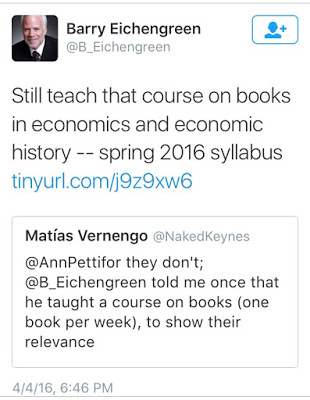Summary:
So Ann Petiffor twitted a link to a post on why economists do not read Polanyi's The Great Transformation (or the other GT; yes the one is Keynes' General Theory) The author, Marko Grdesic, basically suggests that economists do not read books, period.* I would add, let alone Polanyi that was always at the fringes of mainstream economics. He estimates that about 3 percent of economists have read Polanyi. That reminded me of a story that Eichengreen had told me about a course he taught based on reading books, since he thought that graduate students in economics do not read them anymore, and, even worse, do not quite get the point of writing books. He was nice to twit the link to the current version of the course. I taught in Utah a course that was not directly based on books, but instead on what I referred to as unresolved issues in economic history. These are the ones that involve the big questions, the ones economists do not deal with anymore, at least not often (as discussed yesterday). In a way, I think that the inability to read and appreciate books is also connected to the reduced ability to engage in the big questions.* He points out that: "one economist said, 'I haven’t read Polanyi, nor have I read Smith, Keynes, Hayek, Schumpeter, or Friedman'." Yes, we noticed it.
Topics:
Matias Vernengo considers the following as important: Economic History, Eichengreen, Pettifor, Polanyi
This could be interesting, too:
So Ann Petiffor twitted a link to a post on why economists do not read Polanyi's The Great Transformation (or the other GT; yes the one is Keynes' General Theory) The author, Marko Grdesic, basically suggests that economists do not read books, period.* I would add, let alone Polanyi that was always at the fringes of mainstream economics. He estimates that about 3 percent of economists have read Polanyi. That reminded me of a story that Eichengreen had told me about a course he taught based on reading books, since he thought that graduate students in economics do not read them anymore, and, even worse, do not quite get the point of writing books. He was nice to twit the link to the current version of the course. I taught in Utah a course that was not directly based on books, but instead on what I referred to as unresolved issues in economic history. These are the ones that involve the big questions, the ones economists do not deal with anymore, at least not often (as discussed yesterday). In a way, I think that the inability to read and appreciate books is also connected to the reduced ability to engage in the big questions.* He points out that: "one economist said, 'I haven’t read Polanyi, nor have I read Smith, Keynes, Hayek, Schumpeter, or Friedman'." Yes, we noticed it.
Topics:
Matias Vernengo considers the following as important: Economic History, Eichengreen, Pettifor, Polanyi
This could be interesting, too:
Nick Falvo writes Homelessness among racialized persons
Merijn T. Knibbe writes Something about prices (IV). Gift exchange prices.
Michael Hudson writes Should there really be a Supreme Court?
Ahmet Öncü & T.Sabri Öncü writes Waiting for Deglobalisation – I
So Ann Petiffor twitted a link to a post on why economists do not read Polanyi's The Great Transformation (or the other GT; yes the one is Keynes' General Theory) The author, Marko Grdesic, basically suggests that economists do not read books, period.* I would add, let alone Polanyi that was always at the fringes of mainstream economics. He estimates that about 3 percent of economists have read Polanyi. That reminded me of a story that Eichengreen had told me about a course he taught based on reading books, since he thought that graduate students in economics do not read them anymore, and, even worse, do not quite get the point of writing books. He was nice to twit the link to the current version of the course. I taught in Utah a course that was not directly based on books, but instead on what I referred to as unresolved issues in economic history. These are the ones that involve the big questions, the ones economists do not deal with anymore, at least not often (as discussed yesterday). In a way, I think that the inability to read and appreciate books is also connected to the reduced ability to engage in the big questions.
* He points out that: "one economist said, 'I haven’t read Polanyi, nor have I read Smith, Keynes, Hayek, Schumpeter, or Friedman'." Yes, we noticed it.

